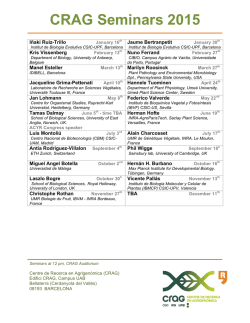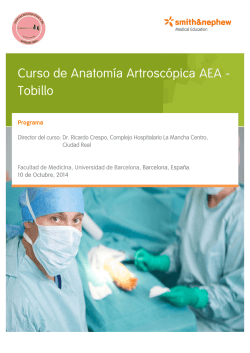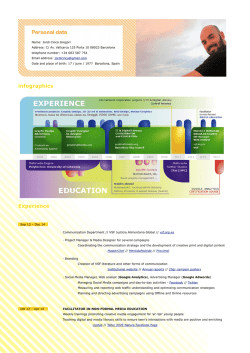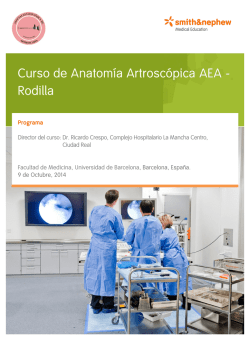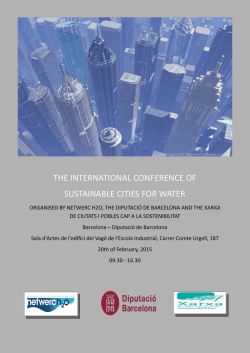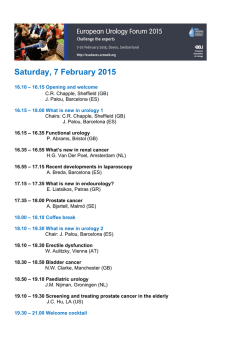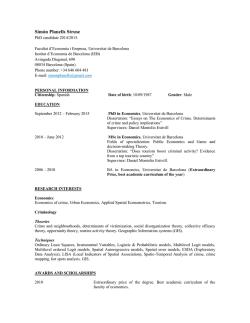
The business of privacy by disaster
Eticas Research & Consulting SL Reloj 2 – 28770 Madrid Ferlandina 49 – 08001 Barcelona www.eticasconsulting.com Barcelona, May 14th, 2015 To whom it may concern, I attach our company’s proposal form an Impact Contribution at EDF2015. Attached you will find a title, abstract, extended abstract and CV. Kind regards, Gemma Galdon Clavell Research Director and Administrator Impact contribution for EDF2015 - Abstract The business of privacy by disaster Instances of 'privacy disasters' have made some players aware that taking privacy into account is not only a matter of social responsibility, but a sound business decision. Incorporating privacy and broader societal concerns into the development of data-intensive technologies can save money in the medium and long term, as well as diminish the risk of reputational crisis. This opens a window of opportunity for privacy advocates and ethical hackers to work with early adopters of real-life privacy enhancing solutions and mechanisms, both in the public and private fields. The session will present the experience on Eticas Research and Consulting, a company founded by social scientists and engineers that has tripled its workforce in its first year of operation and is currently working with public and private clients in the field of border management, biometrics, social media, emergency management, citizen science or data brokers. Impact contribution for EDF2015 – Extended abstract The development of data-intensive technologies produces externalities, both positive and negative. But while positive impacts are often taken for granted, dangers and challenges are minimised. Society is usually made aware of these once there are instances of mismanagement, leaks, fraud or public outcry. This has recently been the case with full-body scanners, that were never fully implemented due to social acceptability issues, smart meters, e-health records, education data and a long list of big and small projects that have been halted or revised due to the lack of proper risk assessment methodologies, able to address legal, ethial and social concerns. But how can these risks be measured and how can impacts on different stakeholders—such as citizens—and their perspectives be taken into account? There are various methodologies and disciplines that have attempted to tackle this challenge, such as Privacy Impact Assessments, Constructive Technology Assessments or Responsible Research and Innovation principles. However, a method that addresses the specific needs of data-intensive security technologies has not yet emerged, and the instances of ‘privacy disasters’ continue to proliferate. Drawing on tools developed elsewhere, and combining them with these specific challenges, Eticas has developed a four-part societal impact assessment (SIA) methodology for the assessment of dataintensive technologies that is sensitive as much to the technological and economic concerns of engineers and decision-makers as to the societal values and the perspectives of citizens. The methodology has been developed to be able to respond to the needs of the different clients of the company, who felt they needed better tools to avoid technological and reputational failures. As such, Eticas methodology is fully demand-driven, as it is the specific demands of its clients that have guided its development and turned a small university spin-off into a growing SME. Societal impact assessment is the evaluation of the risks, externalities and consequences of technologies, policies, programs, and systems. As a result, it must account for a wide range of concerns and stakeholders. Eticas’ methodology first main contribution is to suggest a four-part approach to SIA that can help to assess data-intensive technology used for security. This framework includes many of the terms and concerns included in previous methodologies, but give them coherence, adapt them to the challenges of new technological developments (such as Big Data) and puts forward a specific assessment method to guide decision-making. The framework is based on four main pillars that combine technological policy and sociological perspectives and inputs: desirability, acceptability, ethics, and data management, and provides a means of operationalizing assessment of security technologies to anticipate and compare a range of economic, data and values impacts for various stakeholders (see Figure 1). Figure 1. The four pillars of a Societal Impact Assessment 1. The desirability of a project or technology refers to the very need for a solution, and can be achieved through clear problem definition, good project governance but also cost-benefit analysis. This paper proposes a methodology through which the costs and benefits, economic and beyond, of a security project or technology can be assessed. This methodology, though not always quantifying costs, is a key decision-making support for designers as well as a measure of the value of what is often a public good. 2. The role of acceptability builds on the assessment of the social and public value of a technology or project. Acceptability accounts for the crucial role of how citizens consent to and perceive a technology. This accounts for context and helps to assess proportionality. Drawing on literature on technology acceptance as well as a focus group-based methodology, this paper shows the stakes of accounting for citizens’ perspectives and provides a methodology for doing so. 3. Ethics relates to the values and moral standards guiding a project. These include fundamental rights, inclusivity, the notion of a social contract of state and citizen, trust, as well as what vision of ‘security’ is sought by a project or technology. Even though some of the key values at stake are included in the legal framework, social and technological forecasting are also used as methods to assess long-term externalities on society at large. 4. While data management does refer to the legal framework of privacy and data protection, it also encompasses much broader considerations relating to individual control and consent, methods of anonymization, and how privacy issues can be designed into technologies and projects. This methodology identifies the critical moments in data management on how a responsible approach con contribute to mitigate them or avoid them altogether (see Figure 2). Figure 2. Key vulnerable moments in Data management and how to minimise them Using this methodology, Eticas is able to contribute to responsible research and innovation and to putting societal values at the heart of technological development. Curriculum Vitae PERSONAL INFORMATION Gemma Galdon Clavell Gemma Galdon Clavell Tallers 71, 08001 Barcelona (Spain) +34 654 744 118 [email protected] https://ub.academia.edu/GemmaGaldonClavell Skype gemmatni Sex Female | Date of birth 29/05/1976 | Nationality Spanish WORK EXPERIENCE 2012 to present Research Director Eticas Research & Consulting, Spain ▪ Academic research for private clients (NESTA) and EC-funded projects (ABC4EU, GRAFFOLUTION, GIFT, ORIGINS, INSPEC2T) ▪ Public speaking ▪ Office and personnel management ▪ Oversight of grant writing and justification ▪ Strategic planning ▪ Organiser of biannual Surveillance Studies Conference Business or sector Consultancy & research SME 2012-2015 Postdoctoral Researcher Department of Sociology, Universitat de Barcelona, Spain ▪ Academic research in EC-funded projects (SMART, IRISS, RESPECT) ▪ Average of 3 academic papers in peer-reviewed journals per year Business or sector Academic 2012 Security Programme Director Department of Urban Management, Universitat Oberta de Catalunya, Spain ▪ Security Policies and Technologies Masters director ▪ Academic research ▪ Lecturer at Police Academy Business or sector Academic 2009-2012 Doctoral Researcher Department of Political Science, Universitat Autònoma de Barcelona, Spain ▪ Thesis title ‘Why CCTV. Security, Technology & Urban Policy’ Business or sector Academic 2008-2009 Project Assistant United Nations Institute for Training and Research (UNITAR) ▪ Design and coordination of Security & Public Space programme ▪ Conferences and official visits organised in Latin America and Northern Africa ▪ Official representation of Programme in official visits © European Union, 2002-2013 | http://europass.cedefop.europa.eu Page 1 / 10 Curriculum Vitae Gemma Galdon Clavell Business or sector Intergovernmental organisation 2005-2008 Junior Researcher New Politics Programme, Transnational Institute (TNI), The Netherlands ▪ Research into new forms of political action in Asia and Latin America ▪ Conferences and official visits organised in Latin America and Northern Africa ▪ Report writing ▪ Coordination of decentralised network of experts Business or sector NGO 2003-2004 Translator and interpreter Ediciones de Intervención Cultural, Spain ▪ Identification of relevant books, management of rights and translation EN > ES ▪ Director of Portraits series Business or sector Cultural sector 2002-2003 Research Assistant Department of Applied Economics, Univeristat Autònoma de Barcelona, Spain ▪ EC-funded project on welfare policies in Eastern Europe ▪ Background research and report writing ▪ Coordination of network and organisation of international meetings Business or sector Academic EDUCATION AND TRAINING 2009- 2012 PhD in Public Policy and Social Transformation 8 Universitat Autònoma de Barcelona (Spain) ▪ Multidisciplinary PhD: sociology, criminology, policy & technology ▪ Fully-funded in competitive tender ▪ Graduated Cum laude (with honours) 2008-2009 Master’s in Public Policy 7 Escola d’Administració Pública de Catalunya (Spain) ▪ Political Science ▪ Public tendering ▪ Economics 2000-2001 Graduate Certificate in African Societies 7 Universitat de Barcelona (Spain) ▪ Intercultural Studies 1994-2000 Bachelor Degree in History 6 Universitat Autònoma de Barcelona (Spain) ▪ Contemporary History © European Union, 2002-2013 | http://europass.cedefop.europa.eu Page 2 / 10 Curriculum Vitae Gemma Galdon Clavell PERSONAL SKILLS Mother tongues Catalan, Spanish Other language(s) English UNDERSTANDING SPEAKING WRITING Listening Reading Spoken interaction Spoken production C2 C2 C2 C2 C2 B2 B1 Certificate of Proficiency in English, A French B1 B2 B1 Levels: A1/2: Basic user - B1/2: Independent user - C1/2 Proficient userCommon European Framework of Reference for Languages ADDITIONAL INFORMATION Publications ▪ Galdon-Clavell, G. (forthcoming) “Uncivil cities. Insecurity, policy transfer, tolerance and the case of Barcelona’s “Civility Ordinance”". In Urban Studies. SCI 1,330 Q1 Urban Studies. ▪ Galdon-Clavell, G. (forthcoming) “The SAGE Encyclopedia of Surveillance, Security, and Privacy”. Entries for “Big Data”, “Dataveillance”, “Drones”, “Neighbourhood Watch”, “Smart Borders” and “Spain”. SAGE: London. ▪ Galdon-Clavell, G. and O. Tura (forthcoming) “Jóvenes, internet y política ante el reto de la privacidad”. Jóvenes, Internet y Política. Madrid: Centro Reina Sofía. ▪ Galdon-Clavell, G (2015) “Si la videovigilancia es la respuesta, ¿cuál era la pregunta? Cámaras, seguridad y políticas urbanas”. In EURE, Revista Latinoamericana de Estudios Urbano Regionales, 41 (123). SCI 0,541 Q4 Urban Studies. ▪ Galdon-Clavell, G. (2014) “Surveillance by any other name? Understanding counter surveillance as critical discourse and practice.” Revista Teknokultura, Vol. 11(2). Pgs. 329-348. ▪ Galdon-Clavell, G. and Ouziel, P. (2014) “Spain’s Documento Nacional de Identidad. An e-ID for the 21st Century with a controversial past”. In Boersma, K. et al. (eds.) The History of Surveillance in Europe and Beyond. London: Routledge. Pgs 135-149. ▪ Galdon-Clavell, G. and J.L. de Vicente (2014) Anonymise it! Electronic Self-Defense Handbook. Barcelona: Centre de Cultura Contemporània de Barcelona. ▪ Galdon-Clavell, G. (2014) “Review of Bakir's Torture, Intelligence and Sousveillance in the War on Terror”. Surveillance & Society 12 (2): 307-308. ▪ Galdon-Clavell, G. (2013) "(Not So) Smart Cities? The drivers, impact and risks of surveillanceenabled smart environaments”. In Science and Public Policy, 40 (6). Pgs. 717-723. SCI 0,983 Q2 Public Administration. ▪ Galdon-Clavell, G. (2013) “CCTV in Barcelona: the political economy of surveillance in the (wannabe) global city”. In Ball, K. and Snider, L. (eds.). The Surveillance-Industrial Complex: A Political Economy of Surveillance. London: Routledge. Pgs. 191-207. ▪ Galdon-Clavell, G. and Hosein, G. (2013). “Privacy, Technology and Policy: Social Networks, Data Mining and Surveillance”. Novática, Special English Edition 2012/2013. Pgs. 4-11. ▪ Galdon-Clavell, G. (2013) “Neighbourhood patrols, vigilantism and counter-vigilantism in Spain”. In Statewatch Journal, 23 (2). Pgs. 34-38. ▪ De Hert, P., Galetta, A., Boulet, G., Szekely, I., Vissy, B., Raab, C., Jones, R., Amicelle, A., Moe-Price, M. and Galdon-Clavell, G. (2013) “Regulating surveillance: comparative analysis of European © European Union, 2002-2013 | http://europass.cedefop.europa.eu Page 3 / 10 Curriculum Vitae Gemma Galdon Clavell national experiences”. In The Legal Perspective. Deliverable 2.3 of FP7 IRISS Project. Pgs. 45-65. ▪ De Hert, P., Galetta, A., Szekely, I., Vissy, B., Amicelle, A., Galdon-Clavell, G. and Jones, R. (2013) “Surveillance and democracy: totalitarian and contemporary practices”. In The Legal Perspective. Deliverable 2.3 of FP7 IRISS Project. Pgs. 10-23. ▪ Galdon-Clavell, G. (2013) “The political effects of fear and insecurity”. In The Political Perspective. Deliverable 2.2 of FP7 IRISS Project. Pgs. 29-32. ▪ Galdon-Clavell, G. (2013) “Resisting and negotiating surveillance”. In The Social Perspective. Deliverable 2.1 of FP7 IRISS Project. Pgs. 60-64. ▪ De Hert, P., Fischer, D., and Galdon-Clavell, G. (2013) “Surveillance and equality: social sorting, social exclusion and profiling”. In The Social Perspective. Deliverable 1.2 of FP7 IRISS Project. Pgs. 19-30. ▪ Raab, C., Hallinan, D., Amicelle, A., Galdon-Clavell, G., De Hert, P., Galletta, A. and Jones, R. (2013) “Impacts of surveillance on civil liberties and fundamental rights”. In Surveillance, Fighting Crime and Violence. Deliverable 1.1 of FP7 IRISS Project. Pgs. 254-302. ▪ Rodrigues, R, Friedewald, M. and Galdon-Clavell, G. (2013) “The surveillance industry in Europe”. In Surveillance, Fighting Crime and Violence. Deliverable 1.1 of FP7 IRISS Project. Pgs. 71-156. ▪ Galdon-Clavell, G. (2013) “Las políticas públicas de seguridad en tiempos de inseguridades”. In Canal, R. (ed.) Ciudades y pueblos que puedan durar. Políticas locales para una nueva época. Barcelona: Icària. Pgs. 191-202. ▪ Galdon-Clavell, G. (2013) “Seguridad”. In Lago, P. and Bustinduy, P. (eds.) Lugares comunes: trece voces sobre la crisis. Madrid: Lengua de Trapo. Pgs. 211-229. ▪ Galdon-Clavell, G. (2012) “Entre el discurso y la práctica. Seguridad, inclusión y tolernacia en el ámbito local”. Criminogenesis. Revista especializada en criminología y derecho penal. Vol 9. Pgs. 197-209. ▪ Galdon-Clavell, G. (2012) “Exclusión y excepción en la ciudad segura”, Belil, M. et al (eds.) Ciudades, una ecuación imposible. Barcelona: Icària. Pgs. 229-243. ▪ Galdon-Clavell, G. and Hosein, G. (2012) “Privacidad y nuevas tecnologías. Redes sociales, datos personales y tecnologías de vigilancia ante el reto del respeto a los derechos de las personas”. Novática, 217. Pgs. 4-9. ▪ Galdon-Clavell, G. (2012) “Delincuentes o incívicos. Nuevas inseguridades en el ámbito local”. Montaner, JM. and Subirats, J. (eds.) Repensar las políticas urbanas. Barcelona: Diputació de Barcelona. Pgs. 264-267. ▪ Galdon-Clavell, G. et al. (2012) “CCTV in Spain. An empirical account of the deployment of videosurveillance in a Southern-European country”. Information Polity 17(1): 57-68. ▪ Galdon-Clavell, G. (2012) ‘Urbanscapes of injustice and insecurity’, in Hudson, B. and S. Ugelvik (eds.) Security and Justice in the 21st century. Risks, Rights and the Rule of Law. London: Routledge. Pgs. 121-134. ▪ Fussey. P. and Galdon-Clavell, G. (2011). “Towards New Frontiers in the Study of and the City”, URBE. Revista Brasileira de Gestao Urbana, 3(2): 149-155. Mega-Events ▪ Galdon-Clavell, G. (2011) “Local surveillance in a global world. Zooming in on the proliferation of CCTV in Catalonia”, Information Polity, 16(4): 319-338. ▪ Galdon-Clavell, G. (2011) “El derecho a la ciudad segura”. El derecho a la ciudad. Barcelona: Instituto de Derechos Humanos, 62-78. ▪ Galdon-Clavell, G. and Pybus Oliveras, M. (2011) “Crisis económica y gestión de la inseguridad ciudadana: los mapas de delincuencia”, Revista Catalana de Seguretat Pública, May. Pgs. 79-105. © European Union, 2002-2013 | http://europass.cedefop.europa.eu Page 4 / 10 Curriculum Vitae Gemma Galdon Clavell ▪ Galdon-Clavell, G. (2011) “Seguretat, exclusió i repressió en l’àmbit local”. Nous Horitzons, 200. Pgs. 22-27. ▪ Galdon-Clavell, G. (2011) “The Political Economy of Surveillance in the (Wannabe) Global City”. Surveillance & Society, 8(4): 523-526. ▪ Agustina, J.R. and Galdon-Clavell, G. (2011) “The impact of CCTV on fundamental rights and crime prevention strategies: The case of the Catalan Control Commission of Videosurveillance Devices”. Computer Law and Security Review, 27(2): 168-174. ▪ Galdon-Clavell, G. (2010) “La pulsió securitària a la ciutat contemporània”. Políticas Públicas y Modelos de Ciudadanía. Barcelona: CIDOB and Diputació de Barcelona. Pgs. 65-78. ▪ Galdon-Clavell, G. (2010) “La ciudad asustada. Seguridad, miedo y exclusión más allá de la forma urbana”. Carajillo de las ciudades, 6(2). Presentations, conferences and seminars ▪ “The business of privacy by disaster”. Re:publica15, Berlin, May 6. ▪ “Democratic-common Cities vs Smart-private Cities”. D-CENT Project, Barcelona, May 5. ▪ “Incorporating societal concerns and privacy risks in biometric border control gates: the experience of the ABC4EU project”. Workshop on the use of border security technologies and the implications on the privacy, ethics and data protection/fundamental rights of people crossing the borders. FRONTEX, Warsaw, April 30. ▪ “The Social Impact of the Tension between Privacy and Security. Mapping and Understanding the Economic and the Social Costs of Surveillance”. RESPECT Project, Brussels, April 20-22. ▪ “The future of… Identity”. FutureEverything Conference. Manchester, March 25-27. ▪ “Beyond Privacy by disaster. Toward socio-technical arquitectures for ethical data management”. Cosic Seminar. University of Leuven, March 18. ▪ “Assessing the societal impact of Automated Border Control gates”. Computers, Privacy and Data Protection Conference. Brussels, January 21-23. 2014 ▪ “The societal impact of smart cities. Risks, failures and solutions”. IBM City Labs Workshop. Barcelona, November 10. ▪ “Autoprotecció i defensa de la privacitat a l'era de la vigilància massiva”. The Cold Web Conference. CCCB & Fundació La Caixa, November 6. ▪ “What can human beings and companies do to resist surveillance and get back their rights?” Security & Human Rights after Snowden. Helmholtz Research School on Security Technologies. Berlin, November 7. ▪ “La sociedad a través de la cámara”. Videovigilancia y protección de datos tras la nueva ley de Seguridad Privada. Asociación Profesional Española de Privacidad. Zaragoza, October 22. ▪ “Understanding Social Control in Public Places”. Improving Safety through Urban Design. COST TU1203. Lodz (Poland), October 16. ▪ “Using sociological surveys to map attitudes towards surveillance in Spain”. RESPECT Policy Workshop. Barcelona, September 17-18. ▪ “The economic costs of surveillance”. RESPECT Policy Workshop. Barcelona, September 17-18. ▪ “Do smart cities create smart societies? The rise of techno-fetishism”. Electric Picnic. Dublin, August 31. © European Union, 2002-2013 | http://europass.cedefop.europa.eu Page 5 / 10 Curriculum Vitae Gemma Galdon Clavell ▪ “Peligros y oportunidades de la sociedad de los datos”. Centro de Estudios Andaluces & Zemos98. Sevilla, June 26. ▪ “Monitoring the birth of a European Cloud”. The Danish Borad of Technology. Copenhagen, April 30. ▪ “Back to the future? Undercover police, citizen cops and corporate spies”. Computers, Privacy and Data Protection Conference. Brussels, January 22-24. 2013 ▪ “Social sciences for the Information Society: doing research outside of academia”. Universidade de Minho Seminar Series. Braga (Portugal), December 6. ▪ “La prevenció de la delinqüència a través del disseny urbà”. Jornada Urbanisme Preventiu. COST TU1203. Barcelona, November 14. ▪ “Secure societies. Protecting freedom and security of Europe and its citizens”. Horizons for Social Sciences and Humanities. European Research Council. Vilnius (Lithuania), September 23-24. ▪ “‘Uncivil citizens’. Local powers, exclusion and the defining-up of deviancy in Barcelona”. RC21 Conference 2013. Berlin, August 28-31. ▪ “(Not So) Smart Cities: the societal drivers and impact of smart environments”. Royal Geogrpahical Society’s Annual International Conference. London, August 27-30. ▪ “Videovigilancia, seguridad y políticas urbanas”. XI Congreso español de sociología. Federación Española de Sociología, Madrid, July 10-12. ▪ “Noves formes de control ciutadà a Europa”. Noves tecnologies de guerra, repressió i control ciutadà. Centre Delàs. Barcelona, June 13. ▪ “’Smart’ Cities?”. Securing Europe: Future Threats and Trends. Centre for Irish and European Security & ETTIS. Dublin, May 16. ▪ “Can Smart Surveillance Systems Enhance Privacy?”. Computers, Privacy and Data Protection Conference. Brussels, January 23-25. 2012 ▪ “Smart environments: societal drivers and impact”. PRESCIENT Conference. Berlin, October 27-29. ▪ “Espacio público y ciudadanía”. Mexico-European Union Dialogue. México DF, October 22-24. ▪ “(Not So) Smart Cities?”. SMART Conference, Florence (Italy), September 25-26. ▪ “Políticas públicas de seguridad en entornos urbanos”. Cumbre sobre Seguridad Humana, Pan American Health Organization, Ciudad Juárez, September 5-6. ▪ “Seguridad y cohesion social y comunitaria”. Seminar at Universidad Autónoma de Querétaro (Mexico). September 1. ▪ “Ciencias de la seguridad”. Seminar at the Universidad Autónoma de Ciudad Juárez (Mexico), August 20-30. ▪ “CCTV in Spain: x-raying the fearful city”. 5th International Conference on Information Law and Ethics. Corfú (Greece), June 29-30. ▪ “Public order policing in crisis? Surveillance, kettling and occupy”. The Post-Crash City: Security, Policing and Social Control. University of York, Centre for Urban Research, March 15-16. ▪ “Data Protection and Surveillance in Spain: Strategies and Counterstrategies”. Computer, Privacy and Data Protection Conference. Brussels, January 25-27. ▪ ‘Las políticas de seguridad en Europa. Especial atención a la delincuencia organizada’. II Jornada de Criminología. Universitat Oberta de Catalunya y Centro de Estudios Jurídicos, January 25. © European Union, 2002-2013 | http://europass.cedefop.europa.eu Page 6 / 10 Curriculum Vitae Gemma Galdon Clavell 2011 ▪ “Tecnología, seguridad y control en el espacio urbano: el caso de la videovigilancia”. Sesión especial Criminología, Universitat Autónoma de Barcelona, November 16. ▪ “Políticas públicas de seguridad en entornos urbanos”. Programa de Formación de la Secretaría de Seguridad Pública. Instituto Tecnológico Superior de la Región de Los llanos (Durango, México), November 28-30. ▪ “Las transformaciones de la sociedad civil en la sociedad de la información y el conocimiento”. Jornadas de reflexión y debate del Seminario de Comunicación y Sociedad Civil, Barcelona, October 26-27. ▪ “Propostes alternatives al model policial actual”. Jornada Espai públic, policía i llibertats. Il.lustre Col.legi d’Advocats de Barcelona. October 21. ▪ “Les mutations anthropologiques et juridiques induites par les technologies de sécurité”. Conference Internationale: circulation internationale de l’information. Vers une integration du droit à la vie privée et des technologies de sécurité. Université de Montréal et Laboratoire de Cyberjustice, October 1819. ▪ “La Prevención Social como Respuesta Institucional al Fenómeno Delincuencial”, V Congreso Internacional de Política Criminal y Prevención del Delito, Secretaría de Seguridad Pública, Guanajuato (Mexico), September 27-29. ▪ “Uncivil citizens: how and why Barcelona’s civility ordinance defines-up deviancy”, York Deviancy Conference, University of York, June 29-July 1. ▪ “La Innovación Social en el Programa Marco: SSH y Seguridad al Servicio de una Sociedad de Derechos”, 5ª Conferencia del VII Programa Marco de I+D de la Unión Europea en España, Ministerio de Ciencia e Innovación, San Sebastián, June 20-21. ▪ “Políticas de Seguridad Ciudadana en el Gobierno Local”, Conferencia Internacional sobre Seguridad y Justicia en Democracia, UNAM, Mexico City, June 6-10. ▪ “Authoritarian surveillance and its legacy in Southern-European societies: Greece, Italy, Spain, Portugal”, Ghosts of Surveillance (LiSS Conference), Iasi (Romania), May 3-5. ▪ “CCTV in Spain. An empirical account of the deployment of video-surveillance in a SouthernEuropean country”, Ghosts of Surveillance (LiSS Conference), Iasi (Romania), May 3-5. ▪ “Striving for relevance in academia: studying surveillance in order to understand, expose and engage”, Security Public Policy in an Age of Insecurity, IISJ, Oñati, April 7-8. ▪ “Wikileaks com a sousveillance”, Què ha canviat I què ha de canviar després de WikiLeaks?, Barcelona, ICV, March 10. ▪ “Políticas Públicas de Seguridad en entornos urbanos”, Maestría en Políticas Públicas de la Universidad Autónoma de Ciudad Juárez, UACJ y Colegio de Chihuahua, February 25-28. ▪ “Surveillance by any other name? Understanding counter-surveillance as critical discourse and practice”, Computers, Privacy and Data Protection Conference, Brussels, January 25-28. 2010 ▪ “La ciudad asustada: miedo, exclusión y políticas urbanas”, Ciudades: resistencia local, especulación global. Valparaíso (Chile), December 1-2. ▪ “Vulnerabilitats urbanes”, Repensar les polítiques urbanes 30 anys després, CUIMPB, Barcelona, November 26-26. ▪ “Legitimidad versus eficacia en los sistemas de videovigilancia”, Nuevos retos globales en Ciberdelincuencia, Prevención del Delito Informático y Sociedad de la Vigilancia, Congreso LSPIITLC-IPLC, Barcelona, November 5. © European Union, 2002-2013 | http://europass.cedefop.europa.eu Page 7 / 10 Curriculum Vitae Gemma Galdon Clavell ▪ “The closer the better? The undemocratic urge of security policy at the local level”, Understanding Democratic Governance, Leicester (UK), De Montfort University, September 24. ▪ “Videovigilància als espais públics i semi-públics de les ciutats catalanes”, Videovigilància i protecció de dades: la interficie públic/privat, Universitat de Barcelona and OSPDH, September 23. ▪ “The Political Economy of Surveillance in the (wannabe) global city”, The Political Economy of Surveillance: A Research Workshop, Open University Business School, Milton Keynes (UK), September 9-11. ▪ “Everybody Else Is Doing It, So Why Can’t We? Understanding video-surveillance beyond conspiracy theory”, EASST_010 CONFERENCE Practicing Science and Technology, Performing the Social, Trento (Italy),Septemebr 2-4. ▪ “Polítiques públiques de seguretat: la videovigilància”, L'Ametlla del Vallès, Associació Arrels, July 14. ▪ “Tecnologia, control social i exclusió”, Canvi social i polítiques de resposta, una mirada des del cinema, Barcelona, Escola de Polítiques Socials i Urbanes, July 7. ▪ “Inseguridad, seguridad y políticas públicas en entornos urbanos: el caso de la ‘ordenanza cívica de Barcelona”, X Congreso Español de Sociología, Pamplona, FES, July 1-3. ▪ “New Landscapes of (in)Justice and (in)Security in the City”, New Landscapes of Justice and Security: an Interdisciplinary Seminar, Oslo, University of Oslo – Faculty of Law, June 14-15. ▪ “Seguretat i regeneració urbana”, Jornada d’experts en seguretat, Palma de Mallorca, Consorci de la Platja de Palma, June 4. ▪ “Evolució de la videovigilància a Catalunya: marc legal, anàlisi i perspectives”. Workshop sobre Paisaje ciudadano, delito y percepción de la inseguridad, Oñati, Instituto Internacional de Sociología Jurídica, May 13-14. ▪ “Cultura y ciudad: las otras rentabilidades”. Jornades [act]10, Granada, Diputación de Granada, April 22. ▪ “On CCTV and Public Space: the Panopticon, Still?” A Global Surveillance Society? Conference, London, Surveillance and Society/SSN and Living in Surveillance Societies, April 13-15. 2009 ▪ “Urban Models: the Management of Public Space”. VII Seminari Immigració i Europa, Barcelona, CIDOB, November. ▪ “Ús dels SIG I polítiques públiques de seguretat: anàlisi d’experiències i recomanacions”. Seminari sobre Representació Geogràfica d'Indicadors de Desigualtat i Conflictivitat Locals, Barcelona, Direcció General de Modernització de l'Administració, November. ▪ “Citizenship and Public Space”. Polis21: City, Nationalism, Migration, Athens (Greece), November. ▪ “Las políticas públicas de seguridad”. Escuela de Formación de Izquierda Unida Federal, Madrid, September. ▪ “Public Space and Security”. Barcelona: UAB-IGOP-ISPC, July. ▪ “Social Movements and Security”, session at the Master on Security Policies. Barcelona: UOC-ISPC, February. ▪ “Security and Public Policy”, training session at Diadema’s Town Hall. Diadema (Brazil): Prefeitura de Diadema, CIFAL, February. Projects ▪ Inspiring Citizens Participation for Enhanced Community Policing Actions (INSPEC2T, H2020 SECURITY 2015-2018) © European Union, 2002-2013 | http://europass.cedefop.europa.eu Page 8 / 10 Curriculum Vitae Gemma Galdon Clavell ▪ Recommendations for Reliable Breeder Documents Restoring e-Passport Confidence and Leveraging Extended Border Security (ORIGINS, 7th Framework Programme SECURITY 20142016) ▪ Awareness and prevention solutions against graffiti vandalism in public areas and transport (GRAFFOLUTION, 7th Framework Programme SECURITY 2014-2016) ▪ Automated Border Gates for Europe (ABC4EU, FP7 SEC 2014-2017) ▪ Securing Europe through Counter-Terrorism: Impact, Legitimacy, and Effectiveness (SECILE, 7th Framework Programme SECURITY 2013-2015) Advisory Board. ▪ Increasing Resilience in Surveillance Societies (IRISS, 7th Framework Programme SOCIAL SCIENCES AND HUMANITIES 2012-2015) ▪ Rules, Expectations and Security through Privacy-Enhanced Convenient Technologies (RESPECT 7th Framework Programme SECURITY 2012-2015) ▪ Virtual center of excellence for research support and coordination on societal security (SOURCE 7th Framework Programme SECURITY 2012-2015). ▪ Crime Prevention through Environmental Design and Planning (EUROPEAN COOPERATION IN SCIENCE AND TECHNOLOGY - COST 2013-2016) ▪ Scalable Measures for Automated Recognition Technologies (SMART, 7th Framework Programme SECURITY 2011-2014) ▪ Políticas locales de seguridad en América Latina. Funder: Universidad Nacional Autónoma de México (UNAM, 2012-2015) ▪ Living in Surveillance Societies (EUROPEAN COOPERATION IN SCIENCE AND TECHNOLOGY – COST, 2009-2013) ▪ Efectos del tratamiento y regulación de datos personales en América Latina: los casos de Brasil y México. Funder: International Development Research Centre. Director: David Lyon (2010-2012) ▪ La videovigilància a Catalunya, Funder: Institut de Seguretat Pública de Catalunya. Director: Gemma Galdon Clavell (2012) ▪ Toward a European MA on Urban Security. Funders: Forum Européen pour la Sécurité Urbaine (FESU). Director: François Dieu (2010-2011) ▪ Identitat, sociabilitat i creativitat a l'Àrea Metropolitana de Barcelona. Funder: Pla Estratègic Metropolità. Director: Joan Subirats (2008-2010) ▪ Nous reptes per a la governabilitat de l'espai públic a Barcelona. Funder: IGOP. Director: Mikel Aramburu (2008-2010) ▪ Rebuilding the commons. Funder: Fundación por la Europa de los Ciudadanos. Director: Gemma Galdon Clavell (2008-2009) ▪ Progressive Cities. Funder: Stichting Transnational Institute. Director: Daniel Chavez (2005-2007) ▪ Eurotopia. Funder: European Cultural Foundation. Director: Gemma Galdon Clavell (2005-2007) ▪ Madison Dialogue. Funder: Havens Center. Directors: Daniel Chavez, César Rodríguez and Patrick Barrett (2004-2007) ▪ Networked Politics. Funder: Stichting Transnational Institiute. Director: Hilary Wainwright (2004-2007) ▪ EU Policy coordination. Funder: EC FP6. Director: Miren Etxezarreta (2002-2003) © European Union, 2002-2013 | http://europass.cedefop.europa.eu Page 9 / 10 Curriculum Vitae Honours and awards Gemma Galdon Clavell ▪ Global Policy Fellow at the Institute of Technology and Society, Rio de Janeiro (Brasil), 2015. ▪ PhD with Honours (cum laude), 2012. ▪ Ayuda de especialización e investigación en materia de protección de datos de carácter personal, Catalan Data Protection Agency & Université de Montréal, 2010. ▪ Government PhD grant (competitive), 2009-2012 Memberships ▪ Member of the International Advisory Board of Privacy International ▪ Member of the editorial board of the academic journal IGOPOLIS ▪ Member of the editorial board of the academic journal Teknokultura ▪ Member of the editorial board of the academic journal Revista de Estudios Políticos © European Union, 2002-2013 | http://europass.cedefop.europa.eu Page 10 / 10
© Copyright 2026
